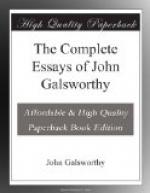made up of money inherited, of interest, of education
fitting us for certain privileged pursuits, of friends
similarly endowed, of substantial homes, and substantial
relatives of some sort or other, on whom we could
fall back—was it possible for any of us
ever to be in the position of having to rely absolutely
on ourselves? For several minutes I pondered
that question; and slowly I came to the conclusion
that, short of crime, or that unlikely event, marooning,
it was not possible. Never, never—try
as we might—could any single one of us be
quite in the position of one of those whose approaching
pauperisation my distant relative had so vehemently
deplored. We were already pauperised. If
we served our country, we were pensioned....
If we inherited land, it could not be taken from
us. If we went into the Church, we were there
for life, whether we were suitable or no. If
we attempted the more hazardous occupations of the
law, medicine, the arts, or business, there were always
those homes, those relations, those friends of ours
to fall back on, if we failed. No! We
could never have to rely entirely on ourselves; we
could never be pauperised more than we were already!
And a light burst in on me. That explained
why my distant relative felt so keenly. It bit
him, for he saw, of course, how dreadful it would be
for these poor people of the working classes when
legislation had succeeded in placing them in the humiliating
position in which we already were—the dreadful
position of having something to depend on apart from
our own exertions, some sort of security in our lives.
I saw it now. It was his secret pride, gnawing
at him all the time, that made him so rabid on the
point. He was longing, doubtless, day and night,
not to have had a father who had land, and had left
a sister well enough off to keep him while he was
waiting for his job. He must be feeling how horribly
degrading was the position of Claud—inheriting
that land; and of Richard, who, just because he had
served in the Indian Civil Service, had got to live
on a pension all the rest of his days; and of Willie,
who was in danger at any moment, if his health—always
delicate—gave out, of having a sinecure
found for him by his college friends; and of Alan,
whose educated charm had enabled him to marry an heiress
and live by managing her estates. All, all sapped
of go and foresight and perseverance by a cruel Providence!
That was what he was really feeling, and concealing,
be cause he was too well-bred to show his secret grief.
And I felt suddenly quite warm toward him, now that
I saw how he was suffering. I understood how
bound he felt in honour to combat with all his force
this attempt to place others in his own distressing
situation. At the same time I was honest enough
to confess to myself sitting there in the cab—that
I did not personally share that pride of his, or feel
that I was being rotted by my own position; I even
felt some dim gratitude that if my powers gave out




